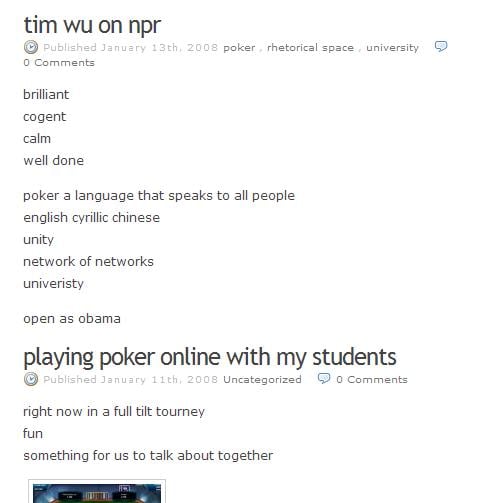Nesson Dorma
Harvard Law professor and academic celebrity Nesson had plucked Lessig from obscurity and helped turn him into an overnight academic superstar in 1997, when with an endowment he set up the Berkman Center for Internet and Society at Harvard Law. Half of Berkman's first-year budget of $5.4m went on procuring and supporting Lessig, WiReD magazine later reported. A kind of techno-utopian think tank, Berkman has become the template for America's burgeoning cyberlaw industry - copied worldwide, and generously funded by consumer electronics and internet companies with their own agendas, such as weakening creators' rights.
(The participants will never put it in quite those terms, for example iCommons filings describe its mission as "promoting practices and tools that encourage liberal permissioning of rights".) When Lessig launched his Creative Commons organisation, he explained it was largely with the help of Berkman.
Nesson suddenly discovered a hitherto unknown interest in poker, which became a very public obsession. Prior to this dramatic 'awakening' in 2007, we can find no blog post where Nesson shows any interest in poker or gambling. But after it, he can talk about little else.
In March 2007, Nesson created an organisation called the Global Poker Strategic Thinking Society (GPSTS) to promote the use of poker as a strategic "teaching tool". Nesson also formally joined as a "member" of iCommons. Lessig also spontaneously discovered a hitherto unseen interest in poker - and became one of the founder members of the GPSTS board.
(GPSTS.org and IETSI.org were registered within days of each other, both in Gibraltar.)
According to an announcement, GPSTS was "organized both as a for-profit and a non-profit corporation. Revenue from the for-profit entity is committed to the non-profit GPSTS Foundation to support open education and iCommons."

A typically stream-of-consciousness Nesson blog post. It may be about poker.
Nesson swung the weight of Harvard behind the issue, and perhaps for the first time, poker lobbyists began to make their way through the hallowed doors of the institution. "It was an impressive crowd consisting of some prominent lobbyists and lawyers for the gaming industry," recounted one attendee of a Harvard Law School meeting in April 2007, convened by Nesson.
Nesson was also busy locally. He hosted a rally of online gambling supporters outside the state Massachusetts state house and testified against the legislation. He lobbied Governor Deval Patrick.
Nesson and Lessig's GPSTS had engaged with the Weiser Group, a lobbying company (pdf) working for Russ DeLeon.
In January 2008, Nesson even appeared on Stephen Colbert's talk show challenging the Presidential Candidates to a game of poker.
We asked Professor Lessig to disclose fully all his meetings with the gaming lobby. Lessig had made a keynote speech at the GIGSE conference in Montreal in May 2006.
"I met Anurag [Diskhit] exactly once in London at his request to discuss ways he could contribute to supporting a free Internet. I've met Russ two or three times, but have had no contact for sometime."
"Since those contributions, I in fact have promoted no public policies related to online gambling."
Pick-and-Mix Ethics
But did the poker lobbyists get their money's worth?
That's a hard question to answer. Although its founder preaches the gospel of transparency - Lessig sits on the boards of Maplight.org and the Sunlight Foundation - the organisation he founded does not practice what it preaches. Creative Commons does not disclose a list of its donors. This makes it hard to tell whether the poker industry still sees Lessig as a financial connection worth maintaining. What is not in dispute is that by 2007 the poker lobby had an energetic champion in Congress - Barney Frank - so deodorising their reputation by hiring star academics was less important.
In 2007 Lessig announced he was giving up his copyright work to focus on "corruption" in the US political process. His inaugural 'Change Congress' lecture harshly criticized academics as acting as "shills" for lobbyists. Ironically, ChangeForCongress has yet to disclose its donors either.
We reminded Professor Lessig of Dikshit's guilty plea for wire fraud, and asked whether he felt iCommons should repay the donations.
This is what he told us:
"IETSI has been convicted of nothing. And as the terms of Mr. Dikshit's plea did not include any request or suggestion that funds he had contributed be returned, the answer to your question is no. Whether iCommons will is something you need to address to iCommons."
Perhaps it's naive to expect academics to uphold the values they preach. Academia is a vast industry in its own right, and the poker money trail is a way of what the commercial world would call "realising synergies".
Even "Ethics Centres" aren't immune.®
